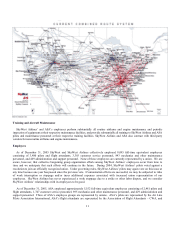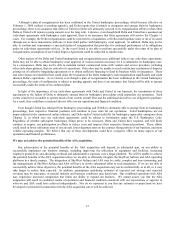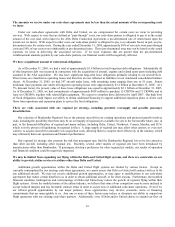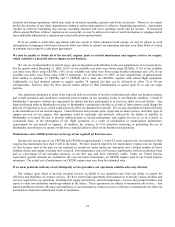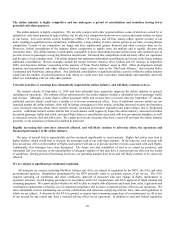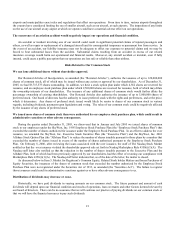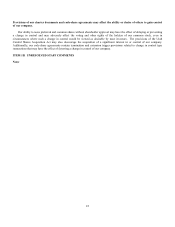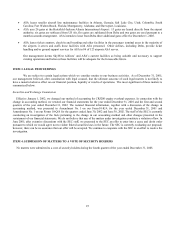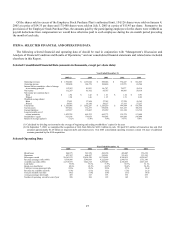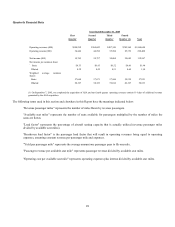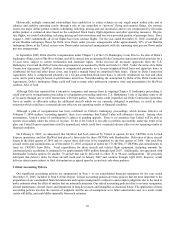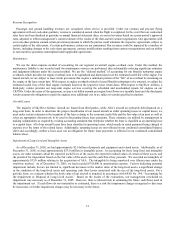SkyWest Airlines 2005 Annual Report Download - page 25
Download and view the complete annual report
Please find page 25 of the 2005 SkyWest Airlines annual report below. You can navigate through the pages in the report by either clicking on the pages listed below, or by using the keyword search tool below to find specific information within the annual report.21
airports and municipalities enact rules and regulations that affect our operations. From time to time, various airports throughout
the country have considered limiting the use of smaller aircraft, such as our aircraft, at such airports. The imposition of any limits
on the use of our aircraft at any airport at which we operate could have a material adverse effect on our operations.
The occurrence of an aviation accident would negatively impact our operations and financial condition.
An accident or incident involving one of our aircraft could result in significant potential claims of injured passengers and
others, as well as repair or replacement of a damaged aircraft and its consequential temporary or permanent loss from service. In
the event of an accident, our liability insurance may not be adequate to offset our exposure to potential claims and we may be
forced to bear substantial losses from the accident. Substantial claims resulting from an accident in excess of our related
insurance coverage would harm our operational and financial results. Moreover, any aircraft accident or incident, even if fully
insured, could cause a public perception that our operations are less safe or reliable than other airlines.
Risks Related to Our Common Stock
We can issue additional shares without shareholder approval.
Our Restated Articles of Incorporation, as amended (the “Restated Articles”), authorize the issuance of up to 120,000,000
shares of common stock, all of which may be issued without any action or approval by our shareholders. As of December 31,
2005, we had 58,715,575 shares outstanding. In addition, we have a stock option plan under which 4,562 shares are reserved for
issuance, and an employee stock purchase plan under which 2,500,000 shares are reserved for issuance, both of which may dilute
the ownership interests of our shareholders. The issuance of any additional shares of common stock would further dilute the
percentage ownership of existing shareholders. Our Restated Articles also authorize the issuance of up to 5,000,000 shares of
preferred stock. Our board of directors has the authority to issue preferred stock with the rights and preferences, and at the price,
which it determines. Any shares of preferred stock issued would likely be senior to shares of our common stock in various
regards, including dividends, payments upon liquidation and voting. The value of our common stock could be negatively affected
by the issuance of any shares of preferred stock.
We issued more shares of common stock than were authorized by our employee stock purchase plan, which could result in
administrative sanctions or other adverse consequences.
During the quarter ended December 31, 2005, we discovered that in January and July 2005 we issued shares of common
stock to our employees under the SkyWest, Inc. 1995 Employee Stock Purchase Plan (the “Employee Stock Purchase Plan”) that
exceeded the number of shares authorized for issuance under the Employee Stock Purchase Plan. In an effort to address the over
issuance, we amended the SkyWest, Inc. Executive Stock Incentive Plan (the “Executive Plan”) and the SkyWest, Inc. 2001
Allshare Stock Option Plan (the “Allshare Plan”) to reduce the number of shares issuable pursuant to those plans by a number that
exceeded the number of shares issued in excess of the number of shares authorized pursuant to the Employee Stock Purchase
Plan. On February 8, 2006, after reviewing the issues associated with the over issuance, the staff of The Nasdaq Stock Market
notified us that the over issuance violated the shareholder approval rule set forth in Nasdaq Marketplace Rule 4350(i)(1)(A). The
Nasdaq staff letter also notified us that the reduction in the number of shares issuable pursuant to the Executive Plan and the
Allshare Plan, both of which had been previously approved by our shareholders, had the effect of restoring our compliance with
Marketplace Rule 4350(i)(1)(A). The Nasdaq staff letter indicates that, as of the date of the letter, the matter is closed.
As discussed below in Item 5. Market for Registrant’s Common Equity, Related Stock holder Matters and Issuer Purchases of
Equity Securities, the issuances of the shares of common stock that exceeded the number authorized by the Employee Stock
Purchase Plan were not registered under the Securities Act of 1933, as amended (the “Securities Act”). The failure to register
those issuances could result in administrative sanctions against us or have other adverse consequences to us.
Distribution of dividends may decrease or cease.
Historically, we have paid dividends in varying amounts on our common stock. The future payment and amount of cash
dividends will depend upon our financial condition and results of operations, loan covenants and other factors deemed relevant by
our board of directors. There can be no assurance that we will continue our practice of paying dividends on our common stock or
that we will have the financial resources to pay such dividends.


